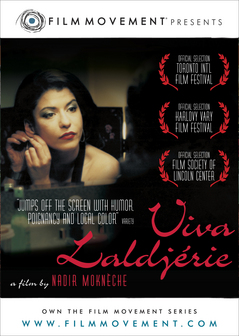
There are many amazing scenes in Nadir Moknèche's second movie, Viva Laldjérie. I guess my favorite would be the one where Goucem, a 27 year old single lady, has wild sex with a sexy jock she picked up in a nightclub in Algiers. As both of them are on fire and not interested in anything than a hookup, they go some underground place used by queers for their own pleasures. While Goucem and her partner fuck fiercely in this open space, they are being observed by Samir, a sexy guy who had been following Goucem for a while, and by Yacine, the gay son of Goucem's regular sugar daddy, Aniss. This scene offers a dizzy combination of voyeurism, cruising, and impersonal intimacy based on the confused dynamics of burning desires and clair obscure identities.
It all happens in the capital of Algeria, in 2003, when the country is trying to recover from the terror of the 1990s, but is still struggling with the corruptive authority of dictatorship and the rise of an oppressive Islamization of the nation. In such a difficult context, not much space is left for individualism and diversity, and yet Viva Laldjérie focuses on the lives of anonymous characters, three women and one gay men, who all fight with courage and dignity in order to express themselves against any norms, including when the price to pay is likely to become a social outcast or to end up assassinated. Yacine tries to be as openly gay as possible, but he is either beaten up by closeted Arabic men who become aggressive after sex or harassed by the police who do not tolerate any explicit homosexual identity.
In the end, Yacine wants to escape Algeria and go to France in order to live his sexuality without fearing for his life. Goucem is still single at 27 and she is not a virgin any longer, plus her married sugar daddy finally leaves his wife, but only to marry another of his mistresses. Goucem's situation as a straight woman with no children and no husband pushes her toward the edge, just like her neighbor Fifi who finally decided to work as a prostitute in order to maintain an agency of her own.
For a camp audience, the most beloved, dramatic character remains Goucem's mother, La Papicha, who used to work as a cabaret artist at Le Copacabana, a cabaret that had to be closed in the 1990 under the threat of religious terrorism. More fabulous than ever as 50 year old drama queen - absolutely worthy of some Almodovar divas - she refuses to beg for a French visa, teaches a little girl how to dance and bemuse men, and dreams of buying Le Copacabana in order to open it again.
Subtle, brave, oscillating between camp and pudor, Viva Laldjérie pays an emotional tribute to those who face infamy and pressure with the unexpected strength and beauty of sexual and gender mavericks. Thanks to them, and to directors such as Nadir Moknèche, there is space for hope, solidarity, and a better understanding of a nation in the making.
And good news: You can watch the entire movie via Hulu now!